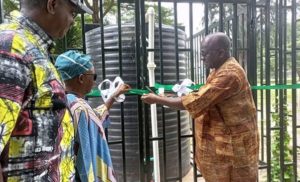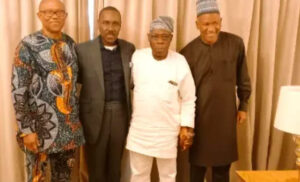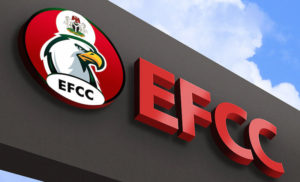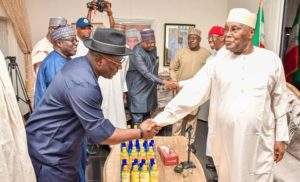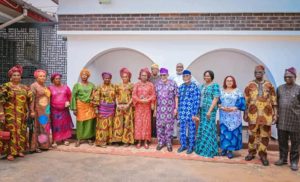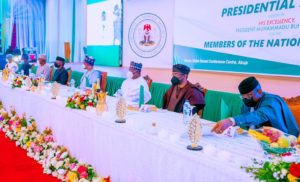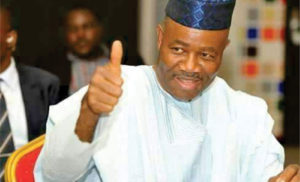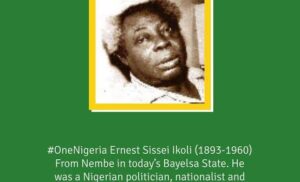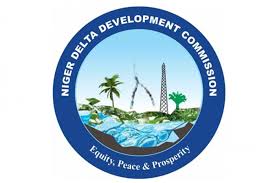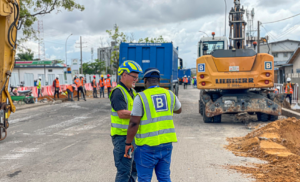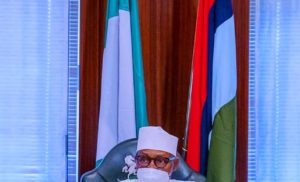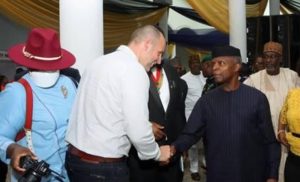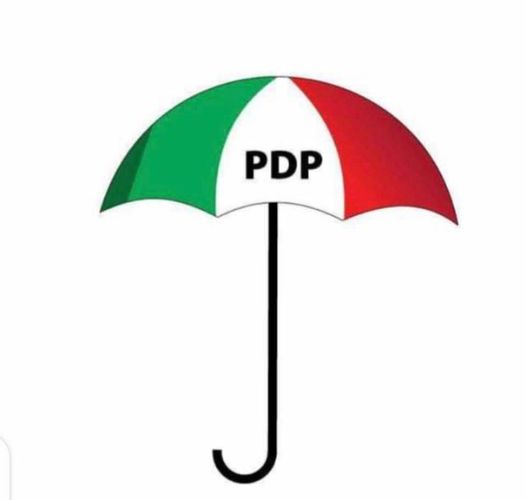
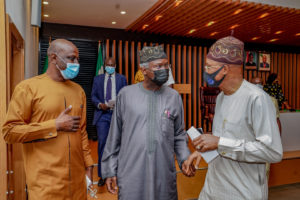
PRESS RELEASE
12th September, 2021
PDP grateful to Isoko South 1 Constituents, Supporters, Deltans; Congratulates Hon. Ovuakpoye Evivie on Bye-Election Victory
Peoples Democratic Party, (PDP) in Delta State, has congratulated party faithful, supporters, and the people of Isoko South Local Government Area, for doing the party proud with their votes and ensuring the resounding victory of the PDP, in the bye-election into the Delta State House of Assembly, on Saturday, September 11, 2021.
The PDP, in a congratulatory Press Release signed by the State Publicity Secretary, Dr. Ifeanyi Osuoza, expressed gratitude to the people for believing in the party, saying that the resounding victory has profoundly accentuated the point that the people of Isokoland, nay Deltans, love our party and was a clear and emphatic statement of the party’s overwhelming supremacy in Isoko South Constituency 1 and Isoko nation in general.
The statement reads: “Delta State PDP is overwhelmed with gratitude to the good people of Isoko South Constituency, our party leaders, faithful members, supporters, and the entire Isoko nation, for the resounding victory which delivered our candidate, Hon. Ovuakpoye Evivie to the Delta State House of Assembly, in the Isoko South Constituency 1 Bye-Election held on Saturday, September 11, 2021.
“For the records, the PDP and our candidate, Hon. Evivie polled a total of 6,957 votes, to beat its closest rival, the opposition All Progressives Congress (APC) candidate that polled a mere 1,301 votes and it is even shameful that both the APC State Chairman and their candidate in the Isoko South Constituency 1 Bye-Election, were roundly and comprehensively defeated in their units and wards to make the victory even sweeter.
“There’s no doubt that our landslide victory at the Isoko South Constituency 1 Bye-Election is an unequivocal and loud statement with echoes of unblemished transparency and of PDP’s strong footing and supremacy in the politics of Delta State.
“Accordingly, we are expressing gratitude to our dynamic and amiable leader, His Excellency, Senator, Dr. Ifeanyi Okowa (Ekwueme) for his committed leadership style that uprooted and demystified every pretension of our opponents to claims of being grassroots politicians and therefore invincible.
“The PDP machine effectively led by Governor Okowa shattered and made mincemeat of the false claims, exposing the APC Chieftains as diaspora “Generals”, who lack political troops in the grassroots.
“They are so-called ‘generals’ who whip up sentiments, make noise, and play to the gallery. Deltans, as the Isoko South bye-election results have again proven, and have underscored the fact for the umpteenth time that Delta State is PDP and PDP is Delta State.
“We congratulate our candidate, Hon. Ovuakpoye Evivie and our leaders and party faithful, in Isoko South, whose combined efforts, synergy, and focus, made this victory possible.
“The victory exemplifies your unflinching support and belief in the PDP and we say a big ‘Thank you’ to you all, even as we call for your continued support and belief in the party now that it is clear that it is only the PDP that can retrieve this nation from the disgraceful brink that the ruling APC at the centre has plunged her.
“Let’s continue to support the PDP and rally around the party with unity of purpose towards achieving the ultimate salvage mission of retrieving our fatherland from the suffocating stranglehold of the APC for the general good of all.
“It is a mission that the PDP is committed to achieving and can only be possible with your continued support.
Isoko South 1, Wa kobiruo!
PDP! Power to the People!!
Dr. Ifeanyi M. Osuoza
State Publicity Secretary,
PDP, Delta State.
September 12, 2021
Press Statement
Anambra Guber: PDP Calls Out INEC Over Alleged Diversion of Electoral Materials to Gov. Uzodinma
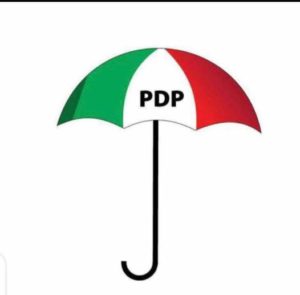
The Peoples Democratic Party (PDP) calls out the Chairman of Independent National Electoral Commission (INEC), Prof. Mahmood Yakubu, to come clean on unpalatable reports in the public space that the commission plans to conduct the November 6 Anambra state governorship election from Imo state.
The party also asked the INEC Chairman to speak to further allegations, especially from the Governor of Anambra state, Governor Willie Obiano, that INEC is planning to recruit returning officers from Imo state as well as to allow the All Progressives Congress (APC)-led government of Imo state to write the original results sheet in Imo state.
The PDP describes the alleged compromises by INEC as vexatious, provocative, completely intolerable and a direct recipe for a serious crisis in Anambra state, the southeast region and by extension derail our nation’s democratic order.
Our party firmly rejects the reported move by INEC to use its facility in Owerri, Imo state capital, for the storage of electoral materials for the Anambra governorship election, rather than in Anambra state.
The PDP holds this stance given the well-known electoral character of Governor Hope Uzodinma and the APC.
Our party insists that any attempt to hand over the materials to Governor Uzodinma by storing them in Imo state amounts to rigging the election before its conduct, adding that such could lead to a breakdown of law and order in the zone and scuttle the November 6 election.
Moreover, if INEC, for any reason desires to keep the materials in another state order than Anambra, the best choice ought to be Enugu state, given the availability of a functional airport, a more secure environment with regional security formations as well as better storage facility at the Central Bank of Nigeria (CBN) in Enugu.
The PDP calls on the INEC Chairman to save the situation by speaking out as well as taking steps to reverse the reported plan, should there be any of such.
The PDP however called on the people of Anambra to remain calm, law-abiding but very vigilant as they rally behind our party and candidate, Valentine Ozigbo, for victory on November 6.
Signed:
Kola Ologbondiyan
National Publicity Secretary
Prof Osinbajo responds to Atiku
LETTER TO THE EDITOR, PREMIUM TIMES, BY PROFESSOR YEMI OSINBAJO, SAN, GCON, VICE PRESIDENT OF THE FEDERAL REPUBLIC OF NIGERIA (Sept 4, 2018)
RE: OSINBAJO GOT IT WRONG ON RESTRUCTURING – ATIKU
Dear Editor,
Kindly permit me a response to a piece in your publication, titled “Osinbajo got it wrong on Restructuring,” written, we are told, by my illustrious predecessor in office, Alhaji Atiku Abubakar.
First, let me say that I really would have expected Alhaji Abubakar to at least get the full text of my comments before his public refutal of my views. But I understand; we are in that season where everything is seen as fair game! He quoted me as saying that “the problem with our country is not a matter of restructuring… and we must not allow ourselves to be drawn into the argument that our problems stem from some geographic re-structuring”.
Yes, I said so.
As the quote shows, I rejected the notion that geographical restructuring was a solution to our national problems. Geographical restructuring is either taking us back to regional governments or increasing the number of States that make up the Nigerian federation.
As we all may recall, the 2014 National Conference actually recommended the creation of 18 more States. And I argued that, with several States struggling or unable to pay salaries, any further tinkering with our geographical structure would not benefit us.
We should rather ask ourselves why the States are underperforming, revenue and development wise. I gave the example of the Western Region (comprising even more than what is now known as the South West Zone), where, without oil money, and using capitation tax and revenues from agriculture and mining, the government funded free education for over 800,000 pupils in 1955, built several roads, farm settlements, industrial estates, the first TV station in Africa, and the tallest building in Nigeria, while still giving up fifty percent of its earnings from mining and minerals for allocation to the Federal Government and other regions.
I then argued that what we required now was not geographical restructuring but good governance, honest management of public resources, deeper fiscal Federalism, and a clear vision for development.
On the issue of deeper fiscal Federalism or restructuring, I explained how the then Lagos State Government, led by Asiwaju Bola Ahmed Tinubu, decided to fight for greater autonomy of States.
As Attorney-General at the time, it was my duty and privilege to lead the legal team against the then Federal government, in our arguments at the Supreme Court. I am sure that Alhaji Atiku Abubakar would remember these cases on greater autonomy for States that I cite below, as he was Vice President of the Federal Republic of Nigeria at the time.
At the Supreme Court, we won several landmark decisions on restructuring Nigeria through deeper fiscal federalism, some of which our late converts to the concept, now wish to score political points on.
It was our counter-claims alongside those of other littoral States, that first addressed so comprehensively the issue of resource control. We agreed with the oil producing States that they had a right to control their resources. We argued, though unsuccessfully, that the Ports of Lagos were also a resource, which should enable Lagos State, in the worst case, to be paid the derivation percentage for proceeds of its natural resources. Years later, we also filed an action at the Supreme Court arguing that the Value Added Tax, being a consumption tax, should exclusively belong to the States.
On the issue of who, between the Federal and State governments, should have authority to grant building permits and other development control permits, the Supreme Court, by a slim majority, ruled in our favour. It held that, even with respect to federal land, States had exclusive authority to grant building or other developments control permits.
In 2004, we created 37 new local governments in Lagos State. We believed that we had a Constitutional right to do so and that in any event, a State should have a right to create its own administrative units. Several other States joined us and created theirs.
The Federal government’s response was to seize the funds meant for our local governments, thus strangulating States like Lagos, which had created new local governments. We challenged this at the Supreme Court. The court held that the President had no right under the Constitution to withhold or seize funds meant for the States. The allocations were not a gift of the Federal Government to the States. They were the Constitutional right of the States and local governments.
The court also agreed that States had a Constitutional right to create local governments, pursuant to section 8 of the Constitution, but that the creation remained inchoate until the National Assembly, by resolution, amended the existing list of local governments to capture the newly created LGs.
In response, we created by State Law, Local Council Development Areas (LCDAs), to accommodate the newly created Local Government Councils until such a time as the National Assembly would complete the process. But the Lagos State Government took up the challenge to re-engineer its revenue service, making it autonomous. With innovative management, tax collection in Lagos became more efficient, and tax revenues continued to grow geometrically. Today, the State earns more IGR than 30 States of Nigeria put together!
Further, we contested the attempts of the then Federal Government to create supervisory authority over the Finances of Local Governments by the signing into law of the Monitoring of Revenue Allocation to Local Governments Act, 2005. The Supreme Court also ruled in our favour, striking down many provisions of the law that sought to give the Federal government control over local government funding.
I have been an advocate, both in court and outside, of fiscal Federalism and stronger State Governments. I have argued in favour of State Police, for the simple reason that policing is a local function. You simply cannot effectively police Nigeria from Abuja. Only recently, in my speech at the Anniversary of the Lagos State House of Assembly, I made the point that stronger, more autonomous States would more efficiently eradicate poverty. So I do not believe that geographical restructuring is an answer to Nigeria’s socio economic circumstances. That would only result in greater administrative costs. But there can be no doubt that we need deeper fiscal Federalism and good governance.
Alhaji Atiku’s concept of restructuring is understandably vague, because he seeks to cover every aspect of human existence in that definition. He says it means a “cultural revolution”. Of course, he does not bother to unravel this concept. He says we need a structure that gives everyone an opportunity to work, a private sector driven economy. Yes, I agree. These are critical pillars of our Economic Recovery and Growth Plan (ERGP), including our Ease of Doing Business Programme.
If, however, this is what he describes as restructuring, then it is clear that he has mixed up all the issues of good governance and diversification of the economy with the argument on restructuring.
Good governance involves, inter alia, transparency and prudence in public finance. It involves social justice, investing in the poor, and jobs for young people; which explains our School Feeding Programme, providing a meal a day to over 9 million public school children in 25 States as of today. Our NPower is now employing 500,000 graduates; our TraderMoni that will be giving microcredit to 2 million petty traders; our Conditional Cash Transfers giving monthly grants to over 400,000 of the poorest in Nigeria. The plan is to cover a million households.
Surprisingly, Alhaji Atiku leaves out the elephant in the room – corruption. And how grand corruption, fueled by a rentier economic structure that benefits those who can use political positions or access to either loot the treasury or get favorable concessions to enrich themselves. This was a main part of my presentations the Minnesota Town Hall meeting.
In arguing for good governance, I made the point that our greatest problem was corruption. I pointed out that grand corruption, namely the unbelievable looting of the treasury by simply making huge cash withdrawals in local and foreign currency, was the first travesty that President Buhari stopped.
I showed the OPEC figures from oil revenues since 1990. In four years from 2010 to 2014 the PDP government earned the highest oil revenues in Nigeria’s history, USD381.9billion. By contrast the Buhari Administration has earned USD121 billion from May 2015 to June 2018, less than 1/3 of what Jonathan Administration earned at the same period in that administration’s life. Despite earning so much less, we are still able to invest more in infrastructure than any government in Nigeria’s history. The difference is good governance, and fiscal prudence.
In the final analysis, restructuring in whatever shape or form, will not mean much if our political leaders see public resources as an extension of their bank accounts.
This, I believe, is the real issue.
Herbert Wigwe wins Leadership Awards’ Banker of the Year
In acknowledgment of his stellar leadership in the market expansion of Sub-Saharan Africa’s largest bank and navigating the challenges posed by the COVID-19 pandemic, the Group Managing Director/CEO of Access Bank PLC Herbert Wigwe has been recognised as the ‘Banker of the Year’ at the 2020 Leadership Conference and Awards, held in Abuja, on Thursday.
The award follows Wigwe’s recognition as the Banker of the Year at the 2021 African Banker Awards (second consecutive time) and Best Banking CEO at the 2021 Global Brands Magazine Awards.
Receiving the Award, Wigwe credited the efforts of all the employees at Access Bank who put a lot into ensuring that the institution has been able to attain the level of success that it has experienced over the last 18 months.
“This Award is dedicated to all the ‘Access Warriors’ who bought into our vision to establish Access Bank as not only the Africa’s gateway to the world, but also as the world’s most respected African Bank. Together, we have been able to provide financial services to over 22 million previously underbanked individuals; given over 1 million women access to financial and non-financial offerings; and set the pace in banking through our novel digital and sustainable initiatives. We would not rest on our laurels, but instead continue to redefine possibilities in sustainable banking,” he said.
Over the years, Wigwe has spearheaded Access Bank’s cultural, technological and digital transformation, which has resulted in sustained year-on-year improvement in financial performance and the creation of strategic initiatives that have positively influenced the Nigerian economy.
Building on its successful expansion into Kenya, Cameroon and most recently, South Africa, Access Bank has also announced plans to make entries into Angola and Mozambique.
PRESIDENT BUHARI EXTOLS ETSU NUPE YAHAYA ABUBAKAR AT 69, PRAISES THE REIGN OF PEACE UNDER HIM
President Muhammadu Buhari has extolled the virtues of the Etsu Nupe Yahaya Abubakar on the occasion of his 69th birthday and 18th anniversary on the throne, describing him “as a remarkable traditional ruler.”
President Buhari, in a goodwill message on Sunday, noted that during Abubakar’s reign, “peace and harmony have thrived in his domain”, adding that “the Etsu Nupe has used his military background and experience to work assiduously for the promotion of peace, harmony and unity amongst his people.”
“Since your appointment 18 years ago to succeed Sanda Ndayako, you have proved yourself worthy of the appointment and, as a retired army general myself, I am proud of your accomplishments on the throne so far,” the President said.
According to President Buhari, “the Etsu Nupe is a humble traditional ruler who has devoted his time and efforts to the promotion of the welfare and progress of his people.”
He explained that “traditional rulers are closest to the people and play critical roles in the promotion of peace and harmony in the country.”
While congratulating Etsu Yahaya Abubakar on the doubly important occasion, the President advised him “not to rest on his oars and continue to offer his fatherly advice to leaders at all levels in order to move Nigeria forward.”
Garba Shehu
Senior Special Assistant to the President
(Media & Publicity)
September 12, 2021
WHAT PRESIDENT BUHARI SAID (DIDN’T SAY) IN IMO STATE
We have observed that President Buhari’s concluding remarks at the meeting with South East Leaders during his one day visit to Imo State is being deliberately contorted and twisted out of context.
The purveyors of disinformation want Nigerians to believe that the President bluntly told Governor Uzodinma, ‘‘I’ll be careful with your future invitations.’’
They have adduced different meanings to the phrase, contrary to the context wherein the President spoke during his successful dialogue with leaders of thought from Igbo land.
When he arrived at the banquet hall of Imo State Government House for his last assignment in Owerri, the President was welcomed by over 50 leaders from the South East who had waited patiently for him for a Town Hall engagement, after commissioning strategic projects in the State.
The President began his extempore speech by acknowledging the caliber of personalities present at the dialogue including the President-General of Ohaneze Ndigbo, Prof George Obiozor, former Chief of General Staff, Commodore Ebitu Ukiwe (Rtd), former Senate President Ken Nnamani, former Military Governor in old Imo State, Senator Ike Nwachukwu, the Obi of Onitsha, Igwe Alfred Achebe, Chairman of the South East Governors Forum and Governor of Ebonyi State, Dave Umahi, Deputy Governors of Abia, Anambra and the SSG of Enugu State, who represented the Governor, the Anglican Archbishop of Owerri Province, Most Rev David Onouha and his brother Bishop of Enugu, Archbishop Emmanuel Chukwuma, Chief Emmanuel Iwuanyanwu, Ahaejiagamba Ndigbo, just to mention but a few.
An elated President Buhari made it clear that he was expressly overwhelmed by the reception and galaxy of personalities that travelled from the five South Eastern States to have a heart-to-heart discussion with him in Owerri, the Imo State capital.
His words were clear:
‘‘I am overwhelmed by this reception, overwhelmed in the sense that when I accepted the invitation by the Imo State Governor, who wants to justify investments the government has done to the people of Imo State, I thought I would see the bridges, the roads and a few renovations.
‘‘He didn’t tell me he was going to get the whole Igbo leadership here. So in the future when he invites me, I’ll know what to do. But I think he has done what the military didn’t like. He has achieved surprise. He has surprised me beyond description.’’
Later, in his concluding statement at the same event, the President made reference to his earlier remarks on the ‘‘surprise’’ action pulled by the Governor. On a lighter note, he quipped:
‘‘Governor of Imo State, I cannot thank you enough, but I will be careful with your future invitations.’’
The President’s historic visit to Imo State was very successful and the Igbo leaders who met him shared the same enthusiasm that his coming to the Eastern heartland would bring peace, foster unity, encourage good and better understanding among the citizenry.
Archbishop David Onuoha, who is the Anglican Archbishop of Owerri Ecclesiastical Province, must have summed up the mood in the words of the prayer offered at the event:
‘‘Thank You dear Lord for our nation Nigeria and her people with diverse backgrounds, nationalities and cultures. Surely You did not make any mistakes in bringing us together.
‘‘Your purpose is for us to harness our potentials/strength to build a strong and virile nation. May this purpose never be defeated.
‘‘Glory be unto You for bringing Your servant and our dear President, His Excellency Muhammadu Buhari, safely to this State. Blessed be Your name for his life and the giant strides he is taking for the wellbeing of our nation.
‘‘Thank you for the huge infrastructural development that is taking place in various parts of the country.
‘‘Lord, Nigeria is a great nation with numerous challenges. We pray that you endue our President with heavenly wisdom, grace and strength. In his resolve to serve this nation, he will not fail, fall or falter. He will end his tenure strong and well to the glory and honour of your name and the good of our people.
‘‘May his visit today bring peace, foster unity, encourage good and better understanding among the citizens of this great nation; may it bring prosperity and restoration.’’
Femi Adesina
Special Adviser to the President
(Media & Publicity)
September 12, 2021
End communications shutdown in Zamfara, Katsina, SERAP tells Buhari
Socio-Economic Rights and Accountability Project (SERAP) has urged President Muhammadu Buhari to “direct the Minister of Communication and Digital Economy, Isa Pantami, and the Nigerian Communications Commission (NCC) to immediately reverse the apparently unjustified suspension of internet and telecommunication networks in Zamfara State, and 13 local government areas of Katsina State.”
The NCC recently ordered telecom operators to suspend all telecommunications networks in Zamfara State, and at least 13 local government areas of Katsina State purportedly to check “banditry”/terrorism.
But SERAP in an open letter dated 11 September, 2021 and signed by its deputy director Kolawole Oluwadare, said: “The suspension of the internet and telecommunication networks in Zamfara and Katsina states, without any legal justification, is inconsistent with the principles of necessity and proportionality. The suspension is a form of collective punishment of Nigerians resident in these states.”
SERAP said: “The suspension of internet and telecommunication networks in Zamfara and Katsina states is particularly egregious, and suggests a disturbing trend, especially given the growing restriction of civic space in Nigeria. Shutdowns should never become an entrenched practice in the country.”
According to SERAP, “While the authorities have a legal responsibility to protect, ensure and secure the rights to life and property, any such responsibility ought to be discharged in conformity with constitutional and international human rights standards.”
The letter, read in part: “Large-scale shutdowns of communication networks are a form of collective punishment. Shutdowns exert significant chilling effects, with direct implications on participatory democracy, whose existence depends upon an active and informed citizenry capable of engaging with a range of ideas.”
“Shutdowns generate a wide variety of harms to human rights, economic activity, public safety and emergency services that outweigh the purported benefits. The suspension has the potential to affect millions of internet and telecommunication users in these states, and those on the margins of society are most impacted by it.”
“The suspension of internet and telecommunication networks in Zamfara and Katsina states fails to meet the requirements of legality, necessity and proportionality.”
“The requirement of necessity also implies an assessment of the proportionality of restrictions such as the telecoms blackout in these states, with the aim of ensuring that restrictions target a specific objective and do not unduly intrude upon human rights.”
“While ‘checking the activities of bandits/terrorists’ in these states could conceivably be viewed as justification for exceptional measures necessary to protect public order or national security, the authorities have so far failed to show how shutting down internet and telecommunication networks in the entire Zamfara State, and 13 local government areas of Katsina State is necessary to achieve the stated purposes.”
“The imposition of any restrictions should be guided by the objective of facilitating the right, rather than seeking unnecessary and disproportionate limitations on it. Restrictions must not be discriminatory, impair the essence of the right, or be aimed at causing a chilling effect. Internet and telecommunication shutdowns fail to meet all of these conditions.”
“Internet and telecommunication shutdowns amount to inherently disproportionate interference with the rights to freedom of expression and information. Necessity requires a showing that shutdowns would achieve their stated purpose, which in fact they often jeopardize.”
“We would be grateful if the suspension of internet and telecommunication networks in Zamfara and Katsina states is reversed within 7 days of the receipt and/or publication of this letter. If we have not heard from you by then, SERAP shall take all appropriate legal actions in the public interest.”
“In their 2011 Joint Declaration on Freedom of Expression and the Internet, four special mandates on freedom of expression emphasised that “’Cutting off access to the Internet, or parts of the Internet, for whole populations or segments of the public can never be justified, including on public order or national security grounds.’”
“The African Commission on Human and Peoples’ Rights has affirmed the principle of non-interference with access to internet and telecommunication networks and stressed that States including Nigeria ‘shall not engage in or condone any disruption of access to the internet and other digital technologies for segments of the public or an entire population.’”
“There is no convincing justification that the stated objectives of checking the activities of bandits/terrorists could not be achieved through measures with a lesser impact on the rights to freedom of expression and information than the wholesale blocking of internet and telecommunication networks in these states.”
“SERAP therefore urges you to sponsor an executive bill to explicitly recognize the right to access and use the internet as a constitutional and legal right, and as an essential condition for the exercise of the rights to freedom of expression and information.”
“The rights to freedom of expression and access to information are protected by Section 39 of the Nigerian Constitution, 1999 [as amended], Article 19 of the International Covenant on Civil and Political Rights, and Article 9 of the African Charter on Human and Peoples’ Rights.”
“These rights must be protected online as they are protected offline. Access to the Internet is a fundamental right. Access to internet is also a necessary precondition for the exercise and enjoyment of human rights online and offline.”
“Your government therefore has a legal obligation to enable access to the Internet for all, as access to the Internet is inextricably linked to the exercise of freedom of expression and information.”
“Access to information, the ability to exercise the right to freedom of expression and the participation that the Internet provides to all sectors of society is essential for a truly democratic society.”
“The rights to freedom of expression and information may be restricted only in specific circumstances. Restrictions on these rights must be provided by law, proportionate, and necessary for respect of the rights or reputations of others or for the protection of national security or of public order, or of public health and morals.”
“Further, any measures to address security challenges must make use of the least restrictive means to achieve that legitimate aim.”
Kolawole Oluwadare
SERAP Deputy Director
12/9/2021
Lagos, Nigeria
Emails: info@serap-nigeria.org; news@serap-nigeria.org
Twitter: @SERAPNigeria
Website: www.serap-nigeria.org
For more information or to request an interview, please contact us on: +2348160537202
